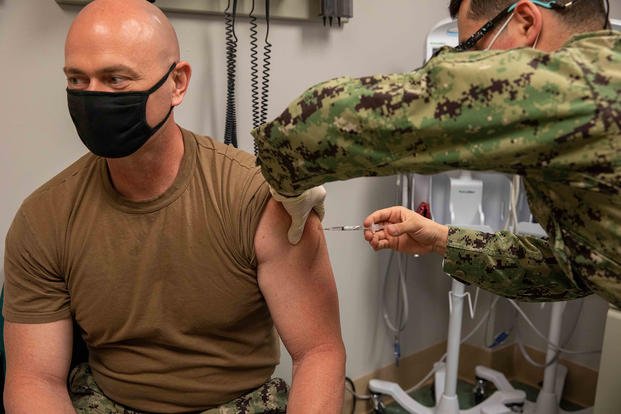The nation's largest health-care system has ordered the majority of its health-care workers to get the COVID-19 vaccine.
Department of Veterans Affairs Secretary Denis McDonough announced Monday that COVID-19 vaccines will be required by all doctors, dentists, physician assistants, registered nurses and other providers known as "Title 38 health workers" or risk their jobs.
The move -- the first for a federal agency -- comes as the country sees an uptick in coronavirus cases caused by the Delta variant and follows the deaths of four unvaccinated VA employees to COVID-19 in the past several weeks -- three of whom had the Delta variant, according to a department release.
"It's the best way to keep veterans safe, especially as the Delta variant spreads across the country," McDonough said in a statement about the mandate. "Whenever a veteran or VA employee sets foot in a VA facility, they deserve to know that we have done everything in our power to protect them from COVID-19."
Read Next: 'They Choose Not to Listen': Thae Ohu Speaks for the First Time on Her Experience in the Marines
During congressional testimony last week, Assistant Under Secretary for Health Dr. Carolyn Clancy said the department has seen an increasing number of hospitalized veterans, 97% of whom were not vaccinated.
She urged veterans and workers to get vaccinated if they have not already done so.
"To those of you listening, I implore you to get vaccinated to help keep yourself, your loved ones and our veterans safe today," Clancy said.
As of Monday, 300,099 VA employees, or roughly 70% of the more then 400,000 workers at the VA, were fully vaccinated, according to a VA database. But increases in cases among employees -- from 192 new cases in June to 390 in July -- have raised concerns of a pending surge, Clancy told members of a House Veterans Affairs subcommittee.
"This surge of infection is causing us to deploy emergency personnel and resources to multiple areas of the country -- signs that we're seeing mirror prior surges and are warning of what's ahead," Clancy said.
Earlier this month, McDonough said he was considering a vaccine mandate, adding that the department had added incentives such as half-day, paid leave for employees who could show they have been vaccinated.
They also are allowed to take leave without being charged for it if they have side effects from the vaccine, according to McDonough.
The legality of requiring vaccines as a condition of employment has been hotly debated since the first coronavirus vaccines were rolled out late last year under an emergency use authorization by the Food and Drug Administration.
The authorization stipulates that individuals receiving a dose must be informed of the "option to accept or refuse administration ... and of the consequences of refusing administration of the product" -- a condition that some legal scholars have taken to mean that requiring a vaccine is illegal.
In May, however, a federal judge dismissed a lawsuit filed by at least 116 employees of a Houston hospital who had been suspended as a result of refusing to get vaccinated against the contagious coronavirus.
Similar lawsuits have been filed in California, North Carolina, New Mexico and elsewhere, but to date, no judge has ruled in favor of the plaintiffs.
Those required to get the vaccine under the mandate include "physicians, dentists, podiatrists, optometrists, registered nurses, physician assistants, expanded-function dental auxiliaries and chiropractors who work in Veterans Health Administration facilities, visit VHA facilities or provide direct care to those VA serves," according to VA.
The number of active cases of COVID-19 in the VA hospital system has more than doubled in the past two weeks, from 1,519 on July 9 to 3,820 as of Monday. More than 272,245 veterans and employees have contracted the virus since the beginning of the pandemic, and 12,679 have died.
VA hospitals seeing a surge of cases in the past several weeks include those in Texas, Florida, Arkansas and Missouri, according to the department.
VA officials added that they have seen recent outbreaks among unvaccinated staff and students at a VA law enforcement training center as well.
A number of medical organizations have expressed support for the VA's new mandate, including the American Hospital Association.
AMVETS issued a statement Monday praising the move, which the organization said will protect veterans.
"[It] is the right thing to do," Joe Chenelly, AMVETS national executive director, said in a statement. "Every VA employee coming into contact with a veteran should be expected to take every measure possible to ensure they are not endangering veterans who are in VA facilities."
Chenelly added that he expects McDonough to receive criticism for the decision but reiterated that the secretary is “putting veteran’s safety first.”
“Through direct communication with the Secretary and his staff, we know he’s taking this seriously, ultimately acting on advice of medical professionals,” Chenelly said.
-- Patricia Kime can be reached at Patricia.Kime@Monster.com. Follow her on Twitter @patriciakime.
Related: Many Soldiers Still Aren’t Vaccinated; What’s The Army’s Plan?












